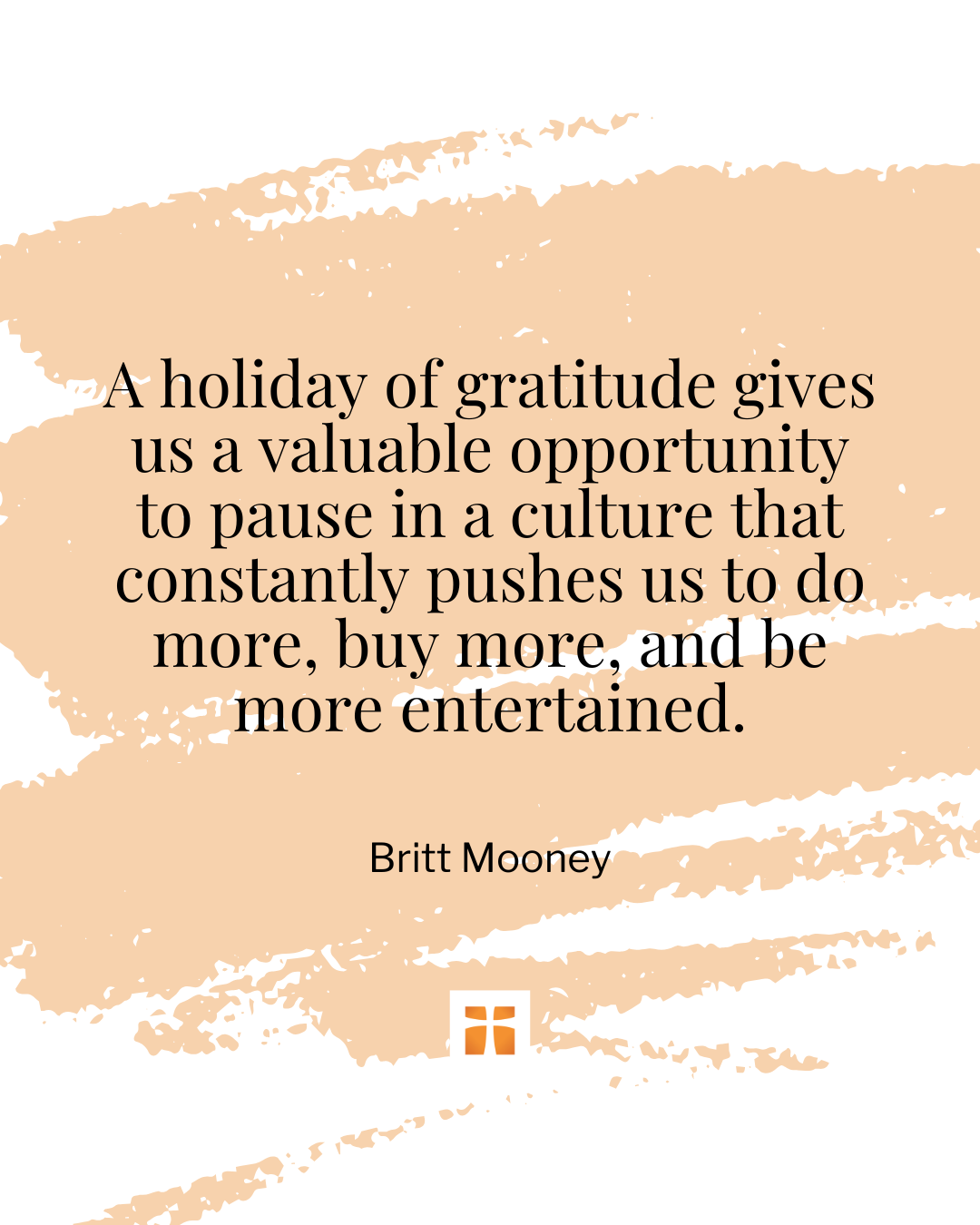The day after Halloween, I went into a local department store, and they had Christmas candy and decorations displayed for sale, three weeks before Thanksgiving.
Thanksgiving allows us a pause during a season that tries to push us forward. Christmas is full of activity, and as such, it pressures us to give our attention to December 25 early. Meanwhile, Thanksgiving provides the opportunity to slow down and recognize God’s goodness. Yet many people barely celebrate Thanksgiving or skip it altogether, all for various reasons.
However, as Christians, we shouldn’t overlook a day devoted to gratitude, especially as Scripture tells us to give thanks in all circumstances.
What Is Thanksgiving?
Thanksgiving began in America in the early 1600s when English settlers and Native Americans shared a meal during a time of hardship. The Pilgrims at Plymouth had a hard time their first season in their new land, and with an abundant harvest the next year, they celebrated. They gathered with the members of the Wampanoag tribe, who had taught them necessary farming skills.
The event wasn’t called “Thanksgiving”, of course, but over time, the historical event became a symbol of cooperation and gratitude for God’s provision. Later, various colonies and states had their own days of thanks, often tied to harvest and answers to prayer. In 1863, during the Civil War, President Abraham Lincoln established Thanksgiving as a national holiday to call Americans to unite in gratitude and humility before God in spite of the national violence and war.
Today, Thanksgiving celebrates personal and communal gratitude. Families and friends gather to share a meal, express their thanks to God, and enjoy specific foods and traditions like parades and football. Thanksgiving still invites us to pause and remember God’s sustaining faithfulness.
Other countries also observe their own versions of Thanksgiving celebrations, usually tied to harvest time. Canada celebrates Thanksgiving in October. Germany has Erntedankfest, a harvest holiday including church services, music, and community times. Japan’s Labor Thanksgiving Day honors crop harvests and the contributions of workers. Some Caribbean nations hold harvest festivals that combine African and Christian practices.
Across the world, people have found the value of thanks in their culture and life.
When Did Christmas Start to Overshadow Thanksgiving?
Christmas has grown into one of the largest holidays in America because it connects religion, culture, and growing capitalist forces. This expansion didn’t happen overnight.
Early American settlers like the Puritans actually discouraged Christmas celebrations because they viewed them as too excitable or even unbiblical, since the New Testament never says to observe Christ’s birth the way it does his death. However, waves of immigrants from Europe arrived and brought their Christmas traditions, like trees, songs, and feasts. The holiday grew in American life.
While American Christians celebrated Christmas, they normally focused more on Easter. But by the 1800s, Christmas had transformed in Europe and the West. Charles Dickens wrote about Christmas and generosity, family, and compassion. At the same time, churches highlighted the incarnation and the birth of the Messiah as the beginning of God’s redemptive story. Many Christian families embraced Christmas as a religious time to express faith in worship and giving.
In the 20th century, however, Christmas exploded into a cultural and economic dynamo. Developments in advertising, mass media, and department stores created a more consumer-driven version of the holiday. Companies secularized the holiday and promoted gift-giving as the main way to express the day. Beginning with Coca-Cola ads, Santa Claus became a major figure of Christmas, the main event for parades. Shopping seasons grew longer, and retail shops realized their Christmas sales made the most profit and could make or break their business.
During the 20th century, Christmas exploded into a cultural and economic powerhouse. Advances in advertising, department stores, and mass media created a new, consumer-driven version of the holiday. Companies promoted gift-giving as the primary expression of love and celebration. Santa Claus became a national icon, supported by everything from Coca-Cola ads to holiday parades. Shopping seasons grew longer, and retailers discovered that Christmas sales could make or break their financial year. This consumeristic Christmas helped solidify the holiday’s massive cultural footprint.
While Christians still center their celebrations around Jesus and the Bible, American Christmas traditions steadily pushed Thanksgiving into the background. Stores launch Christmas sales in early November, and Black Friday (the day after Thanksgiving) now overshadows the quiet and peaceful gratitude Thanksgiving was meant to provide. Decorations appear on front lawns earlier each year. People transition from the pumpkins of Halloween to the ornaments of Christmas without pausing to give thanks. Christmas rushes us to spend money, not be content and thankful.
What Are Some Other Reasons People Gloss Over Thanksgiving?
To be fair, some people in America might skip Thanksgiving for other reasons other than the pull of Christmas.
One might be the lack of marketing and media energy around Thanksgiving. It doesn’t have the commercial power and appeal of Christmas with its movies, advertising, merchandise, cartoons, and music. Without these elements, Thanksgiving feels easier to overlook. Gratitude invites us to reflect and be more content with the simpler things of life, not to be constantly entertained.
Second, some people skip Thanksgiving due to their discomfort with the historical associations. For these individuals, the simplified story of Pilgrims and Native Americans at peace doesn’t communicate the painful reality of colonization, violence, and broken treaties. Native Americans experienced and endured horrible situations. As people become more aware of these issues, they are conflicted about the holiday of thanks tied to injustice. Many Native Americans observe a National Day of Mourning on Thanksgiving to honor ancestors and remember their historic struggles.
Third, as more immigrants come to America, many of them don’t feel a cultural connection to an American Thanksgiving, especially from an event that happened long before they arrived. Some choose to celebrate Thanksgiving to experience American culture. Others don’t see a reason to do so. Perhaps their own cultural traditions have more meaning to them. Their cultures might have their own harvest festivals or days of gratitude. For example, my wife and I celebrated Korean Chuseok while we lived in that country, a harvest holiday with its own traditions.

Why Thanksgiving Matters to Christians
While many might have their own reasons to gloss over Thanksgiving, Christians shouldn’t simply skip it. A holiday of gratitude gives us a valuable opportunity to pause in a culture that constantly pushes us to do more, buy more, and be more entertained. Even if American traditions around the holiday come with complicated associations, Christians can redeem the day by focusing on the core practice of giving thanks. We have every reason to be thankful and celebrate God’s goodness, not because of the holiday’s origins but because Scripture teaches us to live in gratitude.
The Bible places thankfulness at the center of Christian worship. Paul tells us to “give thanks in all circumstances” (1 Thessalonians 5:18) and to bring every request to God “with Thanksgiving” (Philippians 4:6). The psalms contain abundant examples of calls to remember God’s acts and character, praising his name for his love and faithfulness. Thankfulness shapes our hearts and strengthens our faith. Gratitude keeps us from entitlement or fear. When we skip Thanksgiving (in whatever way), we miss an amazing opportunity to practice gratitude.
While some might see the time of Thanksgiving as unfortunate, we actually need it close to Christmas. Thanksgiving helps us resist the rush toward consumerism and activity. When we choose to stop, rest, gather with others, and thank God for the simple blessings of life, we allow our hearts to be content and at peace, so the Christmas season doesn’t overwhelm us. Thanksgiving teaches us to see God’s work in our ordinary lives, preparing us to appreciate the miracle of Christ’s birth with the right heart.
We can also celebrate Thanksgiving without tying it to the Pilgrim narrative. Gratitude to God trumps any cultural idea. Because of God’s great blessings through salvation to his people, we have more reason to celebrate and give thanks than anyone. We can gather with family, pray, share meals, and bless others in need without participating in a past we might disagree with.
When we choose not to skip Thanksgiving, we reclaim a spiritual discipline we need and our culture often resists or neglects. Giving thanks shapes us into a people who remember God, live with joy, and trust his provision.
Ways to Celebrate the Table Before the Tree
Giving thanks doesn’t happen automatically. We need to make space to notice and recognize God’s goodness.
One practical way is to create a gratitude rhythm at home. Families can keep a gratitude journal, or write notes to put in a Thanksgiving jar, or share one thing they thank God for at dinner. These simple, daily habits teach us to pay attention to God’s provision leading up to the Thanksgiving meal and transition to Christmas.
Another discipline is to intentionally slow down on buying things. With the Spirit, we can resist the temptation of early holiday sales or just set a rule that Christmas preparations don’t start until December 1st. By setting boundaries, we give Thanksgiving the space it needs and express that gratitude comes before everything else. Advertising and marketing don’t need to determine our participation or plans.
Thirdly, we should focus on people rather than things. Invite someone who might spend the holiday alone. Share a meal with neighbors, friends, or your church family. Offer encouragement and be welcoming to all kinds of people from all walks of life. Choose to be a blessing to people this Thanksgiving.
Serving and generosity can also be a great way to practice thankfulness. Volunteer at a food pantry, deliver meals to those stuck at home, or donate to a ministry that serves the poor before you spend money on anyone’s gifts. These acts remind us how gratitude leads us to see our wealth of blessings and then give to others.
Lastly, include times of worship for Thanksgiving. Read Scripture together. Pray or read the Psalms of Gratitude. Reflect on specific ways God carried you through the year. Thanksgiving becomes richer when we center it on God’s abundant gifts and faithfulness, even or especially when going through difficult times.
By choosing these practices, we can slow the rush and enjoy Christmas as we should—full of worship, joy, and contentment.
Photo Credit: Juliana Malta/Unsplash




.jpg)
